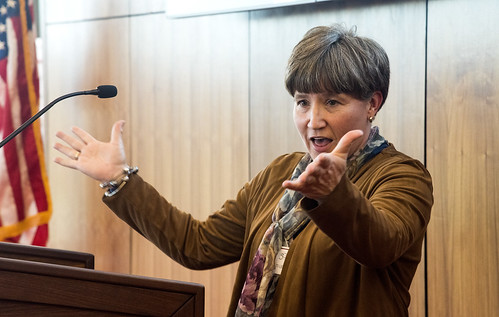Food science department marks 50 years during annual OFPA meeting
By Fred Miller
U of A System Division of Agriculture
Fast Facts:
- UA Food science department celebrates 50thanniversary
- Celebration held during annual OFPA meeting
- Alumni recount impact department made on their lives, careers
(719 words)
Download related PHOTOS from Flickr:https://flic.kr/s/aHsmpsrWpJ
FAYETTEVILLE, Ark. — Responding to emerging needs in Arkansas agriculture in 1968, the University of Arkansas System Division of Agriculture and the U of A’s Dale Bumpers College of Agricultural, Food and Life Sciences organized the department of horticultural food science, led by A.A. Kattan, a pioneer in food research.

Thursday, the department of food science celebrated 50 years of service, leading Arkansas and the world as a leader in research and education for the food industry.
Brian Davis, vice president of research and development for Simmons Foods, extolled the impact the food science program had on his life as a graduate student and on his career.
Speaking during a celebration session during the annual Ozark Food Processors Association at the Arkansas Agricultural Research and Extension Center, Davis said the central lesson he carries with him from school to career is that people are the reason for excelling.
“There’s a lot to celebrate after 50 years,” Davis said. “And the future is certainly bright, especially if we remember why we’re here. People are what makes the difference.”
Davis said the people who made the difference in his academic career in food science included his professors, fellow students, staff and department administrators. From them he found guidance, encouragement and fellowship.
“If we focus on people, the future certainly looks bright, and we’ll be able to celebrate another 25 or 50 years.”
Don McCaskill, who followed his academic career in the early days of the food science program with a long professional career in product development at Riceland Foods and as director of the Riceland Foods Foundation, said he was celebrated 49 years of affiliation with the department.
“When I was considering graduate school, my adviser pointed me toward the new food science department,” he said.
McCaskill met with department head A.A. Kattan and longtime faculty member Justin Morris and decided it was the direction he wanted to take. “And in no time,” he said, “the food science department became my new family.”
Food science alumna Patti Wiese Lehigh said she traces her career success in the food and medical technology industries to the lessons she learned at the U of A. She said she still feels like she has a family in the food science department.
“My professors stressed, ‘research, research, research,’” Lehigh said, “and it has served me well with both my careers and my family.”
Phil Crandall, professor of food science focusing on retail food safety, and a long-time faculty member, said perseverance has been critical to the food industry and the department of food science, and will continue to be so.
“In 1861,” Crandall said, “there were 5 million cans of food produced in a nation of 31 million people. By 1965, at the end of the Civil War, the U.S. produced 30 million cans of food. That’s a six-fold increase in four years.”
Crandall said the food processing industry grew at a rapid pace up to today, and must continue in order to feed an expanding global population.
“Today, the we’re in the top five food science departments in the nation in publications and professionals,” Crandall said. “The food science department must persevere to help combat food insecurity, promote healthy living, and meet food production and processing needs for a growing world.”
To learn more about food science, visit http://catalog.uark.edu/graduatecatalog/programsofstudy/foodsciencefdsc/
About the Division of Agriculture
The University of Arkansas System Division of Agriculture’s mission is to strengthen agriculture, communities, and families by connecting trusted research to the adoption of best practices. Through the Agricultural Experiment Station and the Cooperative Extension Service, the Division of Agriculture conducts research and extension work within the nation’s historic land grant education system.
The Division of Agriculture is one of 20 entities within the University of Arkansas System. It has offices in all 75 counties in Arkansas and faculty on five system campuses.
Pursuant to 7 CFR § 15.3, the University of Arkansas System Division of Agriculture offers all its Extension and Research programs and services (including employment) without regard to race, color, sex, national origin, religion, age, disability, marital or veteran status, genetic information, sexual preference, pregnancy or any other legally protected status, and is an equal opportunity institution.
Media Contact: Fred Miller
U of A Division of Agriculture
Arkansas Agricultural Experiment Station
(479) 575-5647
fmiller@uark.edu
Related Links